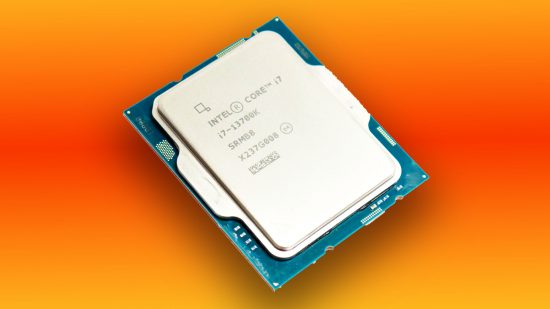Our Verdict
The Intel Core i7 13700K is a good match for AMD’s Ryzen 9 7900X, and with a lower overall system cost, especially if you need lots of multi-threaded power. However, the cheaper Core i5 13600K is a better fit for most people’s needs, particularly when it comes to gaming.
- Great multi-threaded performance
- Lower overall system cost than Ryzen 9 7900X
- Much cheaper than Core i9 13900K
- Core i5 13600K just as fast in many tests
- Power hungry
- Limited overclocking headroom
We’ve had a bombardment of new silicon launches over the last couple of months. AMD and Intel have both fired broadsides of very different CPUs. with the latter focusing on high core counts, its new Raptor Lake architecture, and some very high frequencies to win the fight. The Intel Core i7 13700K is the latest Raptor Lake CPU to land in our lab from the launch lineup, and given that the Core i5 13600K was awesome, we’re excited to see how it fares in our benchmarks.
Compare this new Intel CPU to its 12th gen Alder Lake predecessor, and practically every part of it has been tweaked, from frequencies to maximum turbo power and core count. If it lives up to its promises, then it’s definitely a prime candidate for our best gaming CPU guide.
Why you can trust our advice ✔ At PCGamesN, our experts spend hours testing hardware and reviewing games and VPNs. We share honest, unbiased opinions to help you buy the best. Find out how we test.
Core i7 13700K specs
These are the Intel Core i7 13700K specifications:
| Base clock | 3.4GHz |
| Max boost clock | 5.4GHz |
| Core | Raptor Lake |
| Manufacturing process | 10nm |
| P-Cores | 8 |
| E-Cores | 8 |
| Threads | 24 |
| Cache | 30MB L3, 24MB L2 |
| Memory controller | Dual-channel DDR4 and DDR5 |
| Socket | LGA1700 |
| TDP | 253W |
The number of Raptor Cove Performance cores (P-Cores) has stayed the same at eight, and these cores also support Hyper-Threading, meaning they can execute 16 concurrent threads. However, the number of Gracemont Efficient cores (E-Cores) has increased from eight to 16, with the CPU giving you a total of 16 cores and 24 threads, compared to 12 cores and 20 threads with the Core i7 12700K.
Comparably, its big sibling, the Core i9 13900K, has double the number of E-cores at 16, so will offer significantly more multi-threaded performance. However, the Core i5 13600K sits just behind the 13700K, lacking two of its P-Cores, but sporting the same number of E-Cores, so it gets pretty close in terms of performance to the 13700K, while demanding less cash. Your wallet could be particularly happy here too, as the Core i7 13700K costs a good $100 more than the Core i5 13600K at the moment.
Meanwhile, the boost frequencies of the Core i7 13700K sit a fair bit below those of the Core i9 13900K, with a maximum of 5.4GHz for its P-Cores, and we regularly saw it hitting between 5.3GHz and 5.4GHz in Windows too. This is 300MHz higher than the Core i5 13600K’s boost clock, but 400MHz short of the Core i9 13900K.
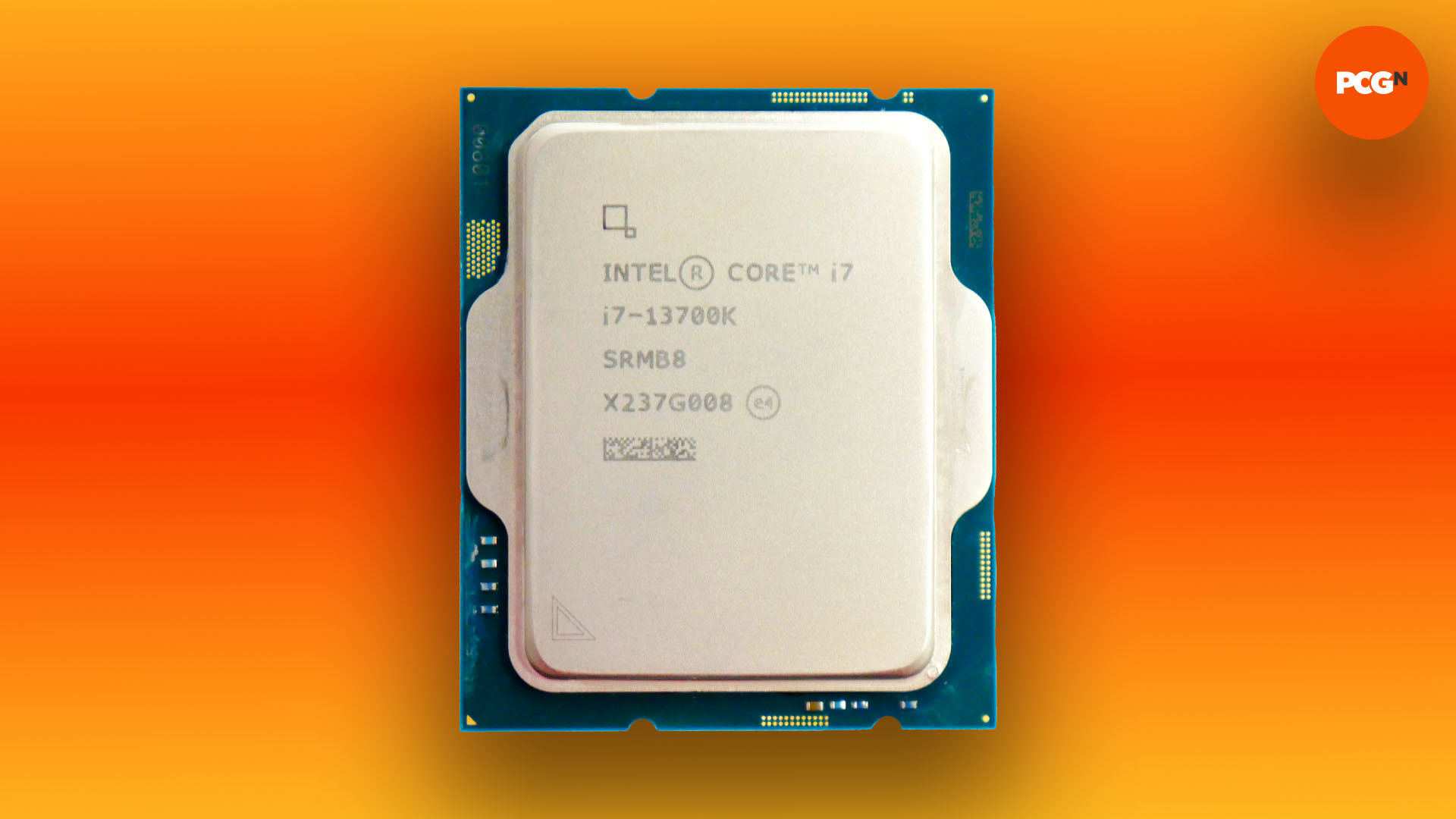
In multi-threaded workloads, we saw the 137000K’s P-cores hit an all-core boost of 5.2GHz as well. This was 100MHz higher than the Core i5-13600K’s all-core boosts, so the Core i7 13700K is a fairly potent CPU out of the box.
As well as having competition from its own siblings, there’s also intense competition from AMD here in the form of the Ryzen 9 7900X. AMD has slashed prices of its Ryzen 7000-series CPUs in recent weeks, in order to tempt people over to its pricey DDR5-only Socket AM5 platform.
However, this has only brought its price in line with that of the Core i7 13700K – the Ryzen 9 7900X still goes for around $450 right now. It lags behind the Intel CPU in terms of its core count, with just 12 of them, but those are all full-on Zen 4 cores and it can handle the same number of threads.
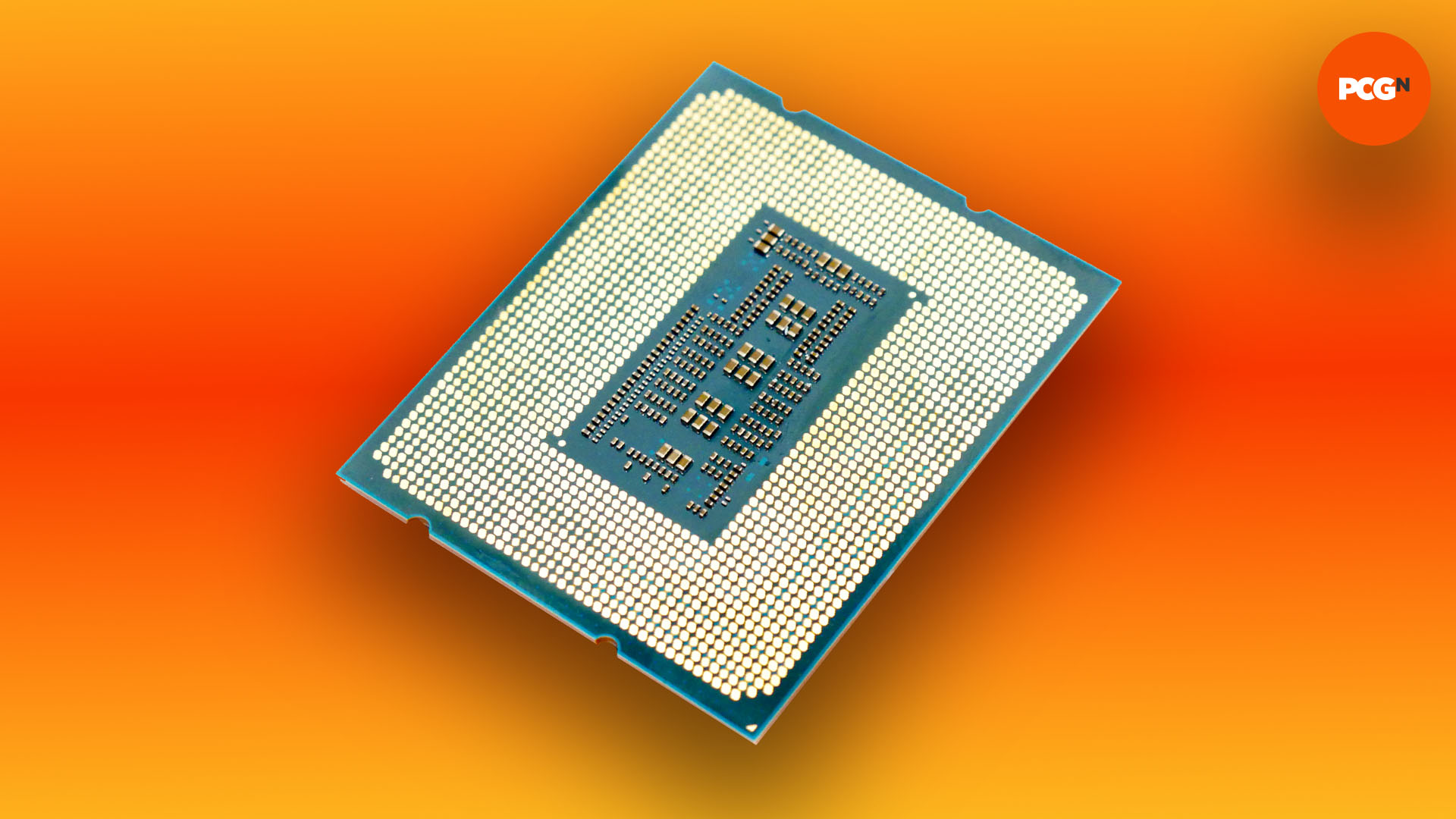
Core i7 13700K overclocking
Overclocking the Core i7 13700K was sadly not as fruitful as it was with the Core i5 13600K, as we could only get our sample to run at 5.5GHz across all its P-cores, while the latter could hit a couple of hundred megahertz higher.
This was enough to provide a 100MHz boost to the maximum turbo frequency, though, and 300MHz to the all-core boost frequency – achieving this overclock required us to input a vcore of 1.35V and for us to open the taps on the power and current limits in our motherboard’s EFI.
Core i7 13700K benchmarks
At stock speed, the Ryzen 9 7900X produced a score of 89,945 in our own RealBench GIMP image-editing test, which stresses single-threaded performance. This was well ahead of the Core i7 13700K, which scored just 82,711, but AMD’s Ryzen 7000-series CPUs have a consistent edge in this test. The Core i5 13600K hit 81,061 here, so it’s very close to the 13700K despite the 300MHz boost clock deficit.
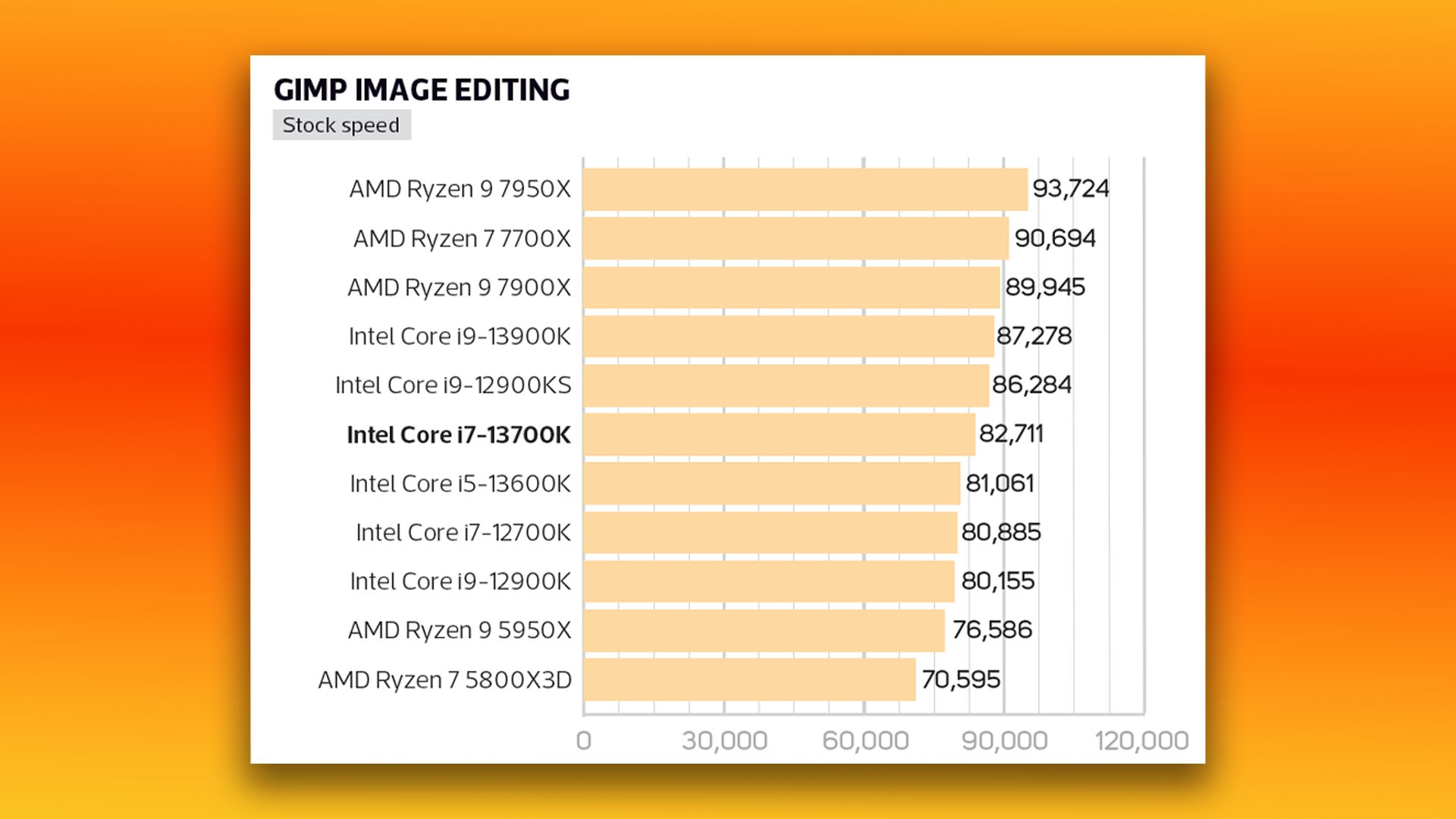
Meanwhile, in our heavily multi-threaded Handbrake video encoding test, the Core i7 13700K managed to score 1,197,961 compared to 1,239,069 for the Ryzen 9 7900X, with a sizeable lead over the Core i5 13600K’s 1,018,435.
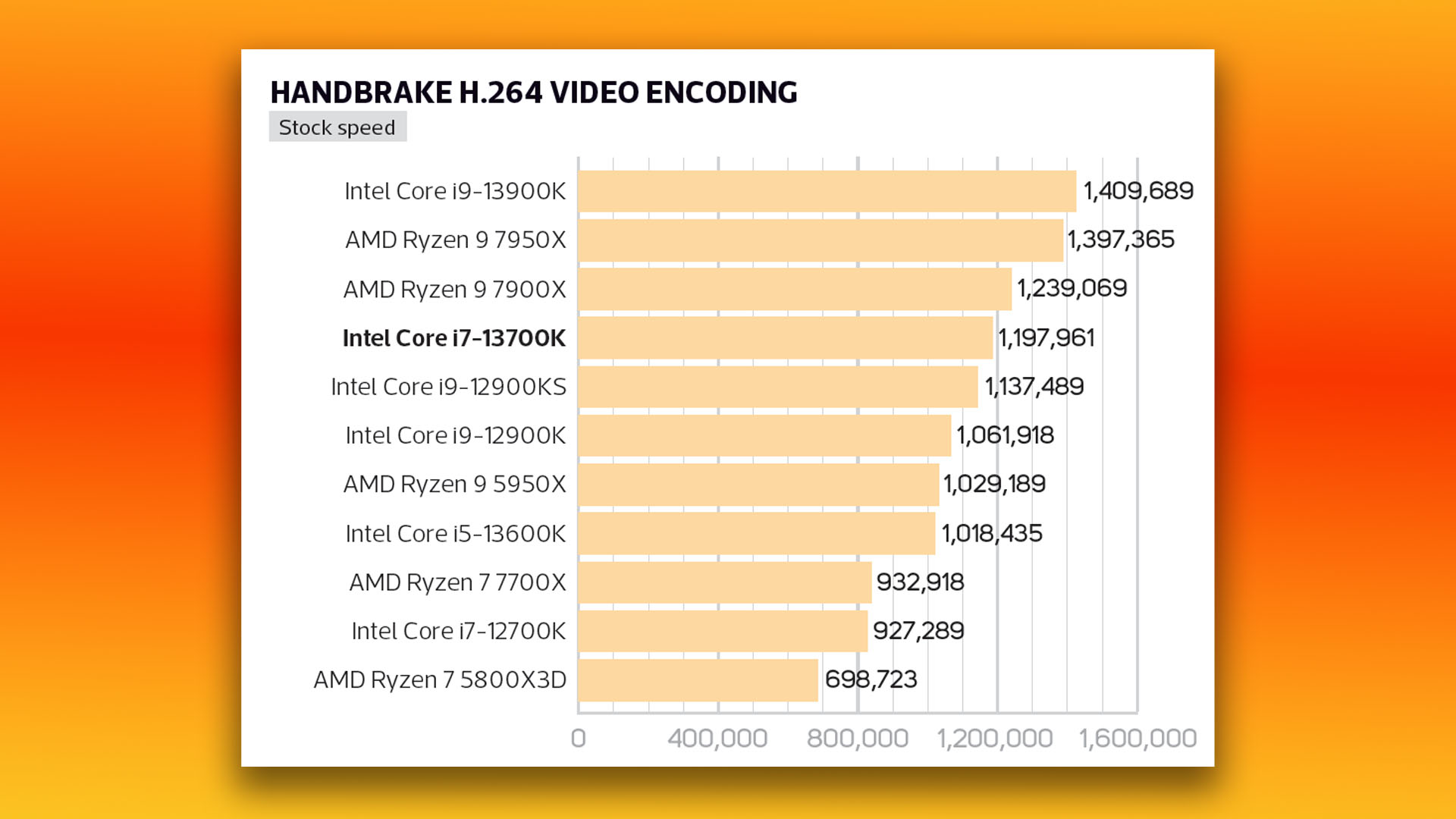
Moving to Cinebench R23’s multi-threaded test saw the Core i7 13700K outpace the Ryzen 9 7900X by over 1,000 points, and its score of 30,137 was way ahead of the Core i5 13600K’s 24,268, showing that the Core i7-13700K is the superior chip for heavily multi-threaded content creation workloads.
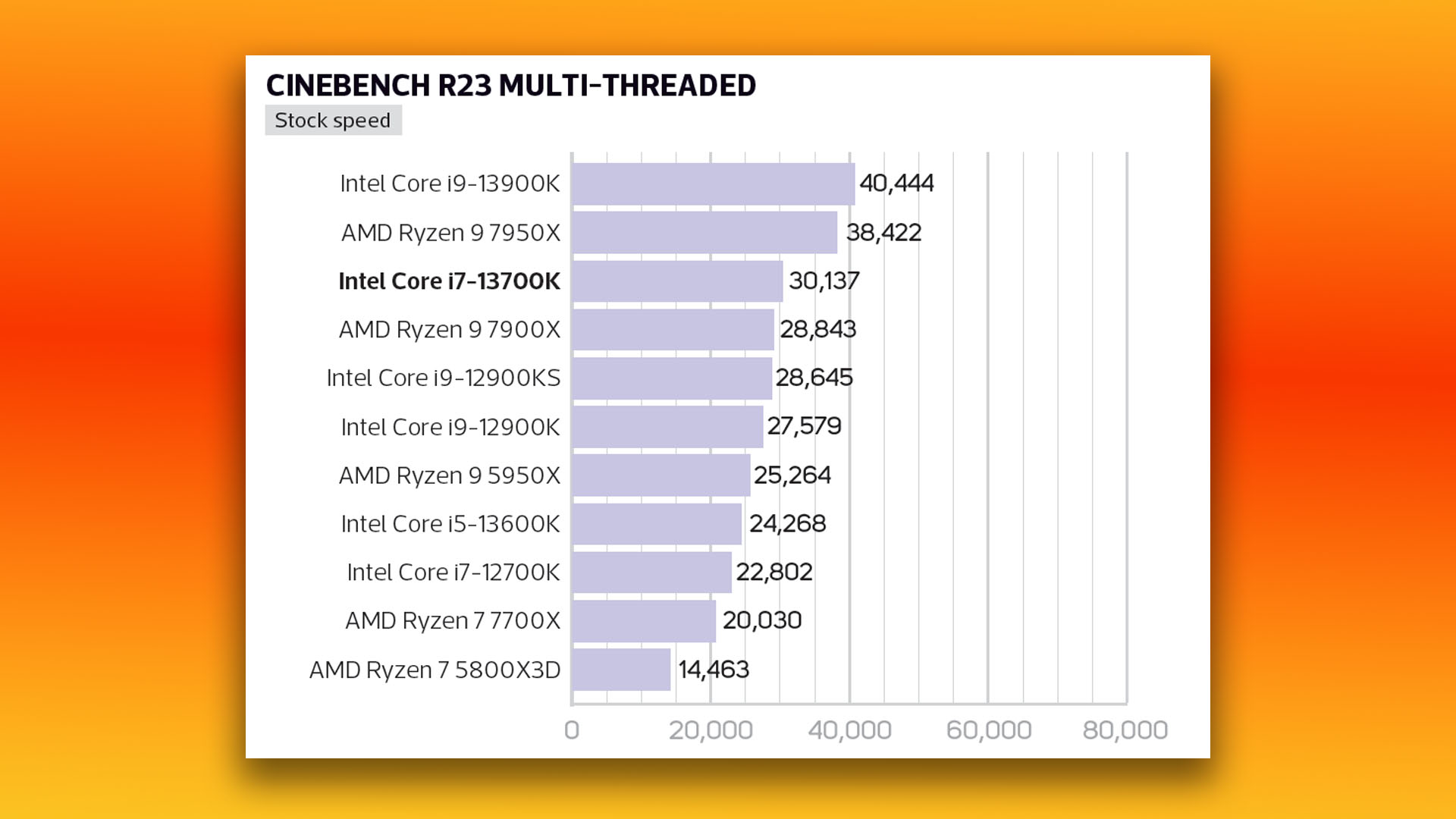
Intel also had a lead in the single-threaded Cinebench test, with a score of 2,099 compared to 2,024 for the Ryzen 9 7900X and 2,011 for the Core i5-13600K.
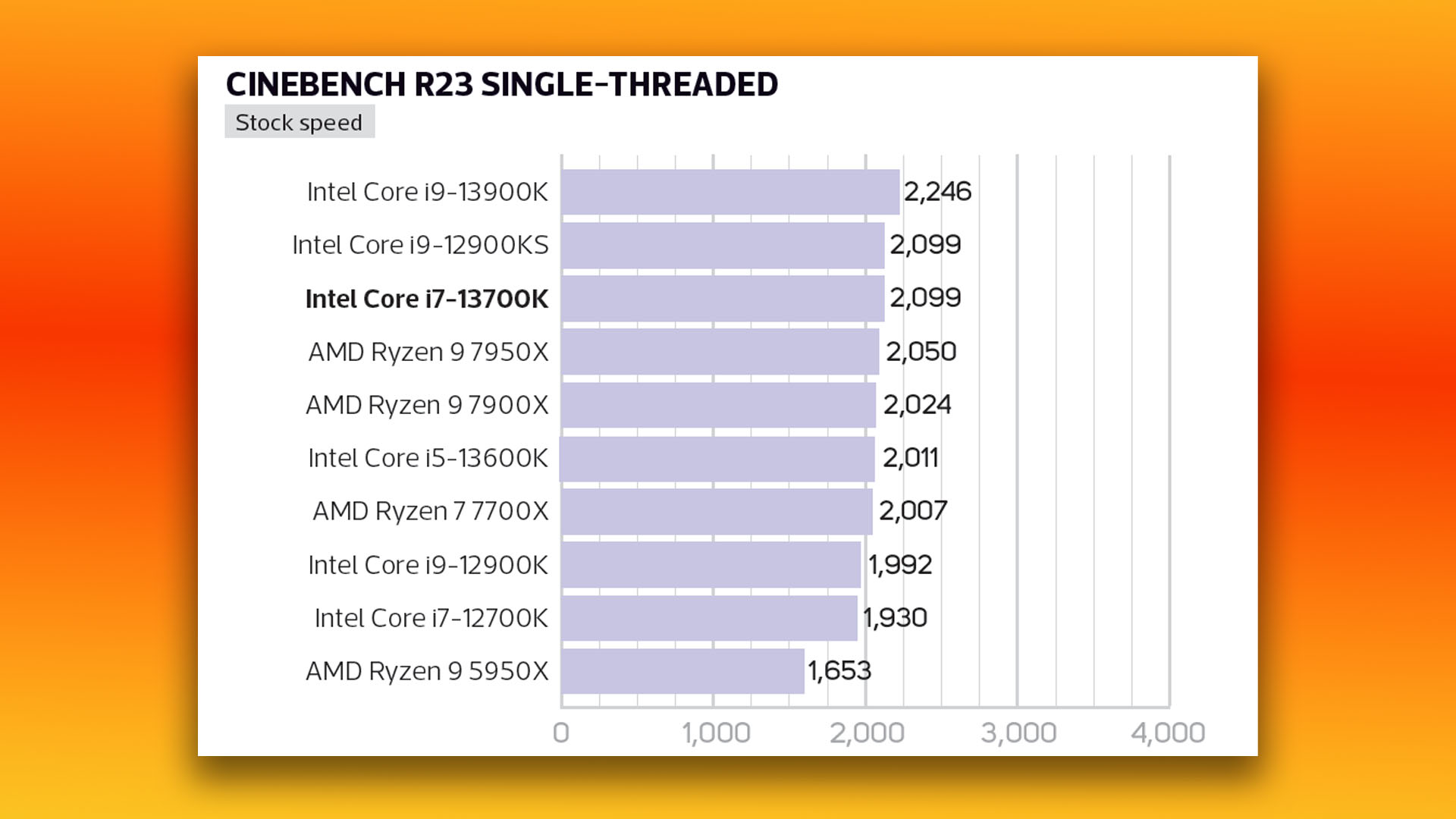
When it comes to games, Intel also led the charge in Far Cry 6, with a 10fps average frame rate advantage over the Ryzen 9 7900X, but only 1fps over the Core i5-13600K, while Watch Dogs: Legion saw all three CPUs producing similar frame rates.
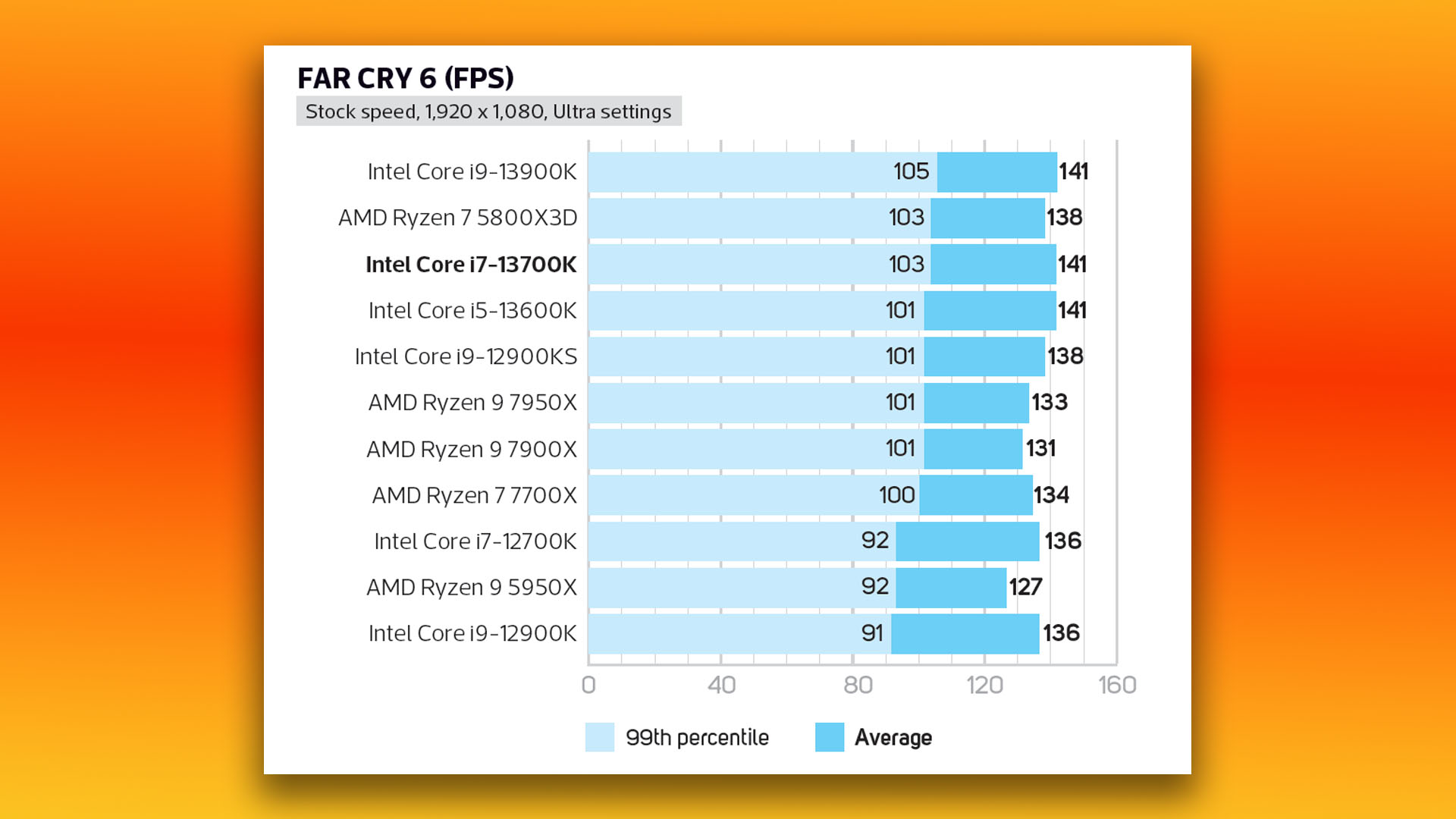
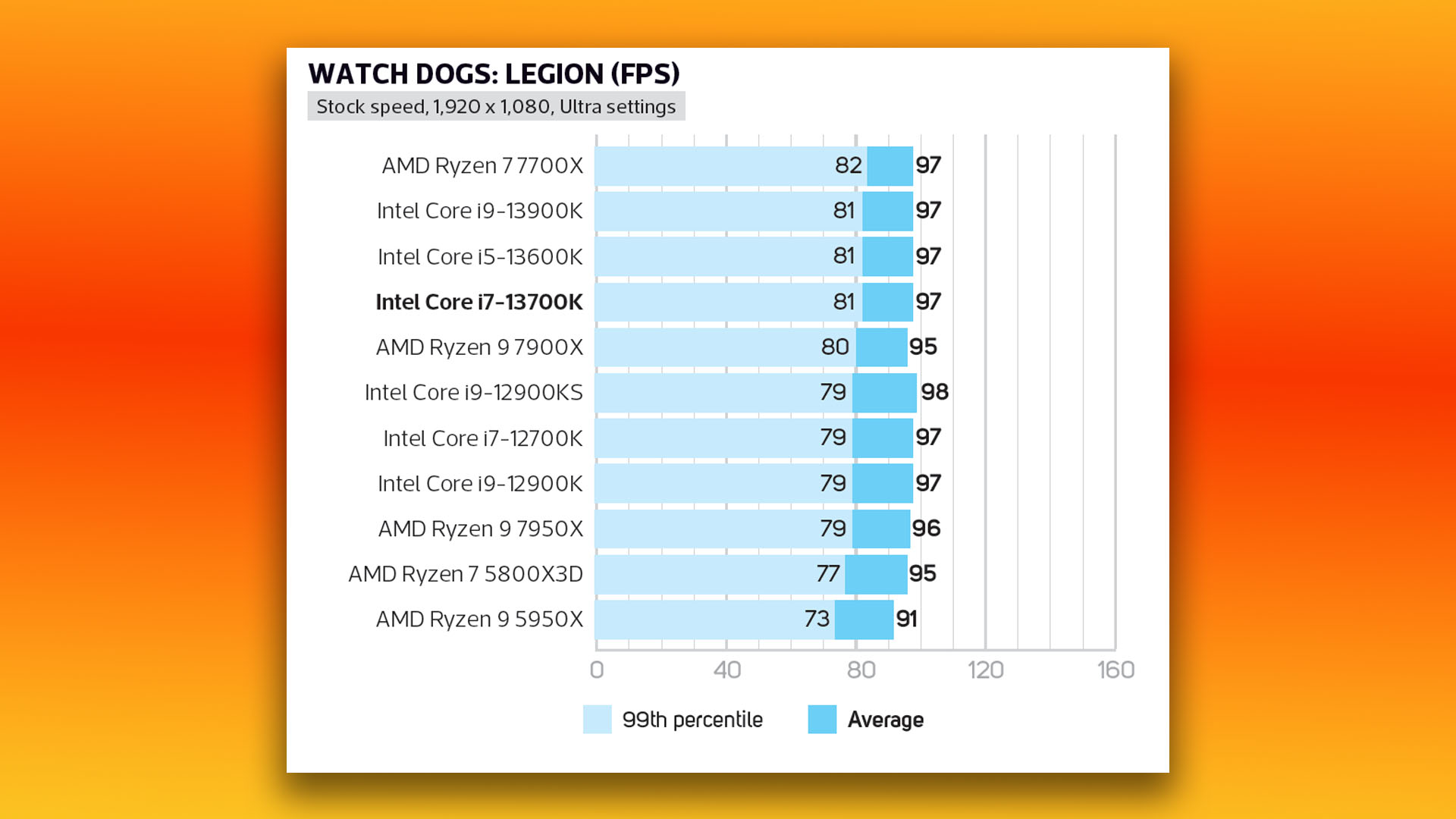
Is it worth overclocking the Core i7 13700K? That depends on how you use your PC. Overclocking added a reasonable amount to our RealBench system score, but not enough to beat the Ryzen 9 7900X, although it came close in the image editing and video encoding tests. The overclock added another thousand points or so in Cinebench too, extending the Intel chip’s lead, but games saw little improvement.
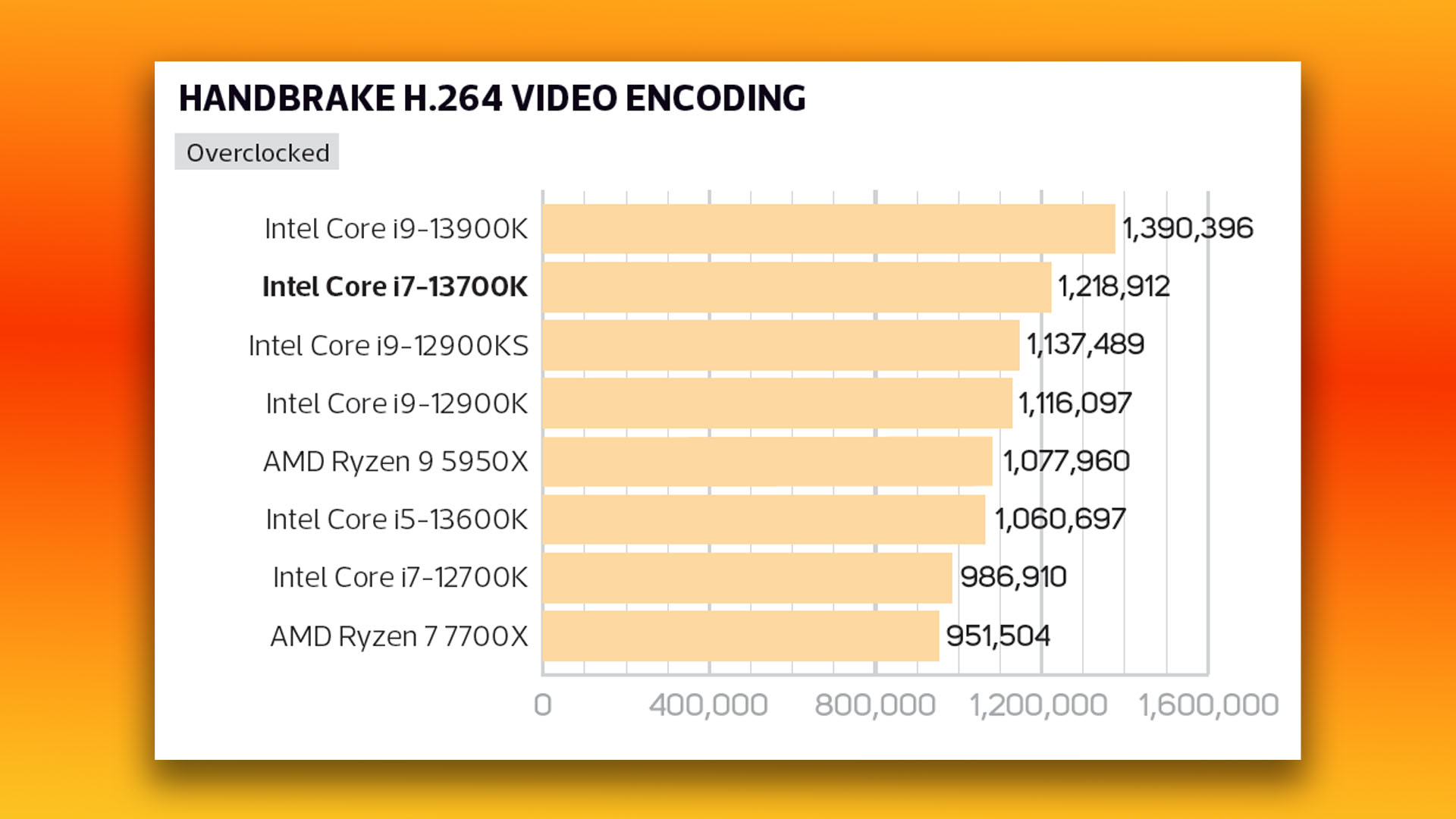
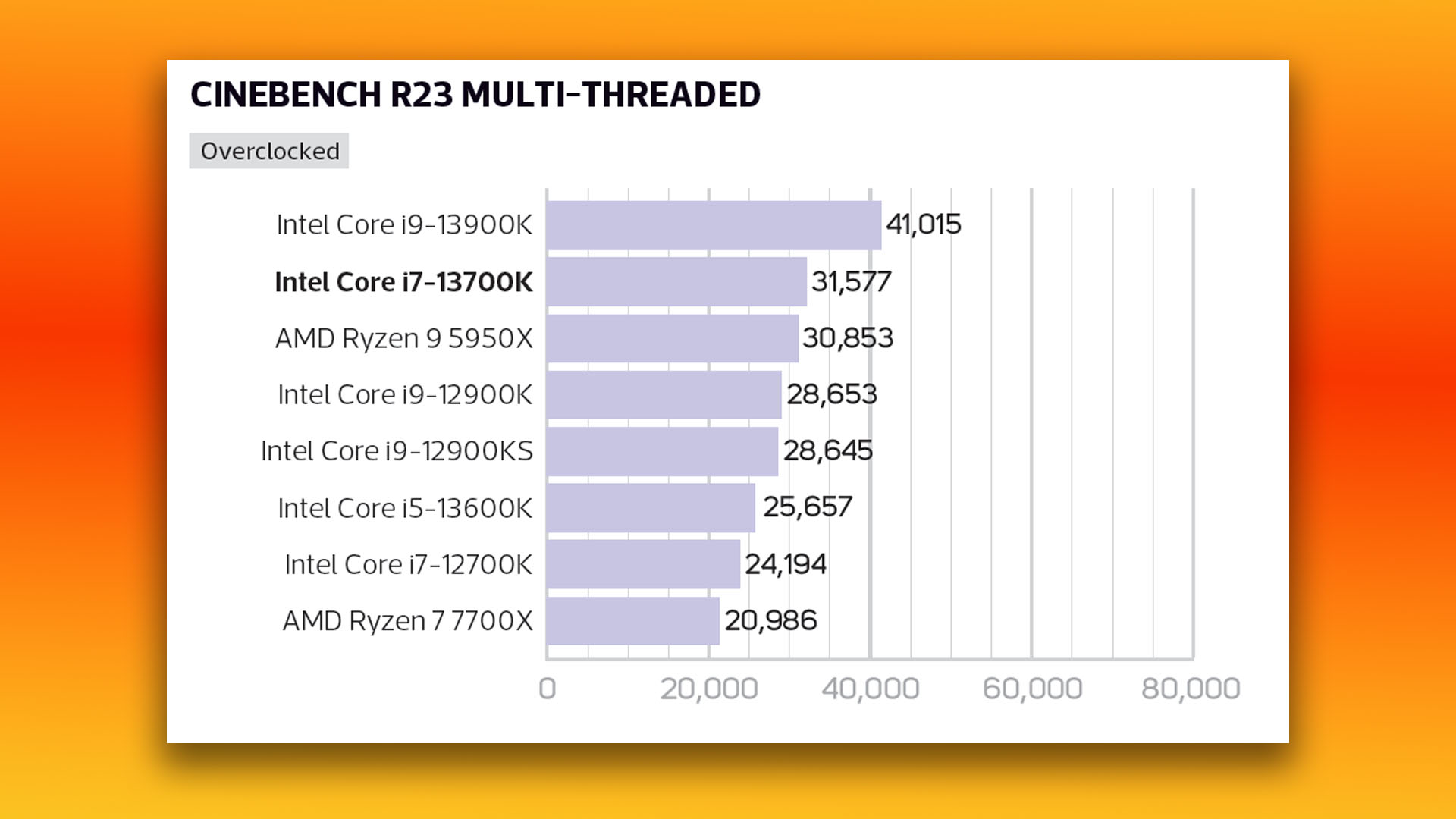
Core i7 13700K power draw
Finally, we come to a big problem for Intel, which is the Core i7 13700K power draw. We measured the total system power draw at the mains at full load, and it drew 389W with the Core i7 13700K running at stock speed, and a massive 415W when the Intel CPU was overclocked.
As a point of comparison, our test rig only drew 325W from the mains at full load with the AMD Ryzen 7900X installed, showing that AMD clearly has the upper hand over Intel right now when it comes to performance per Watt and power efficiency.
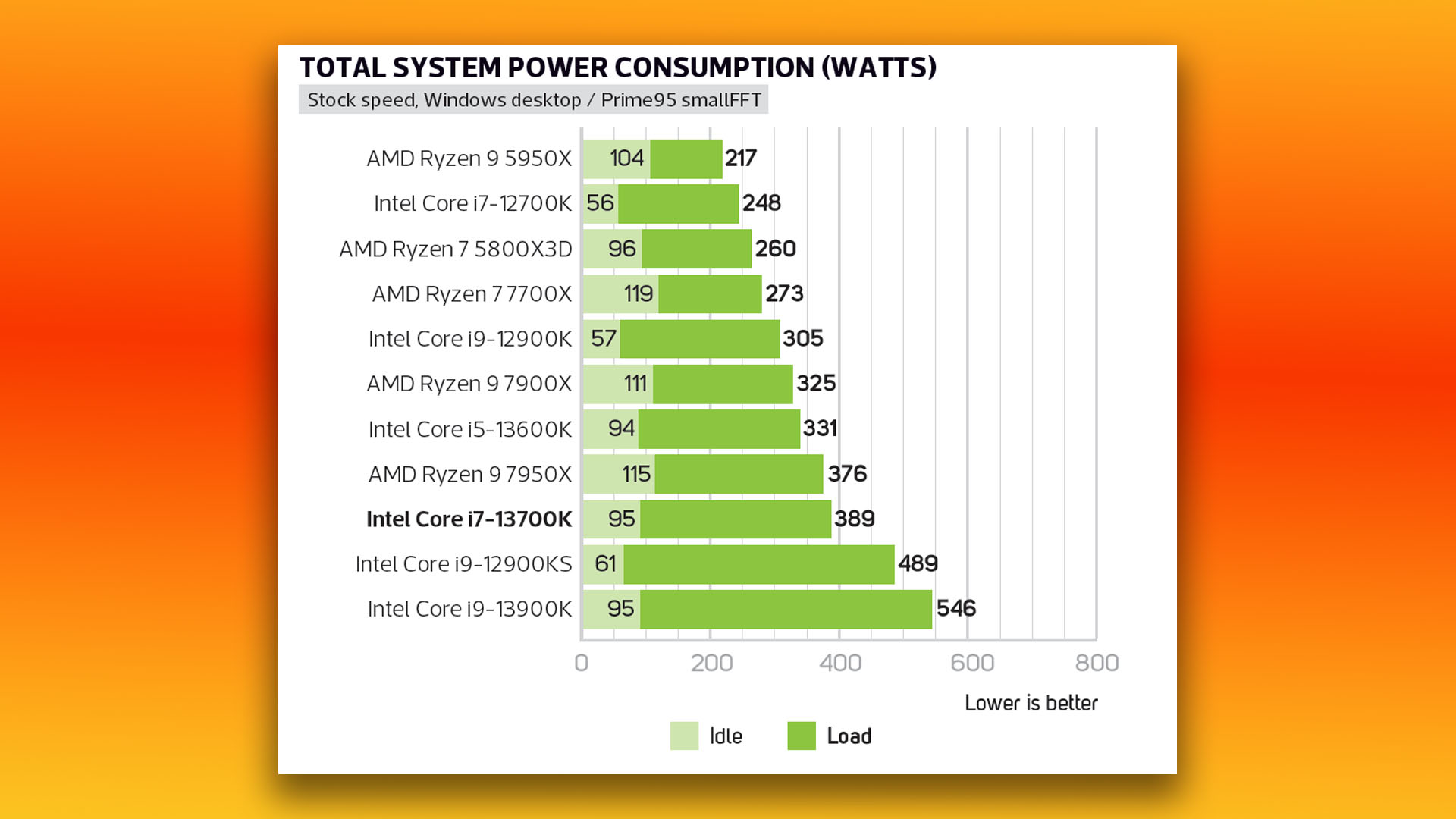
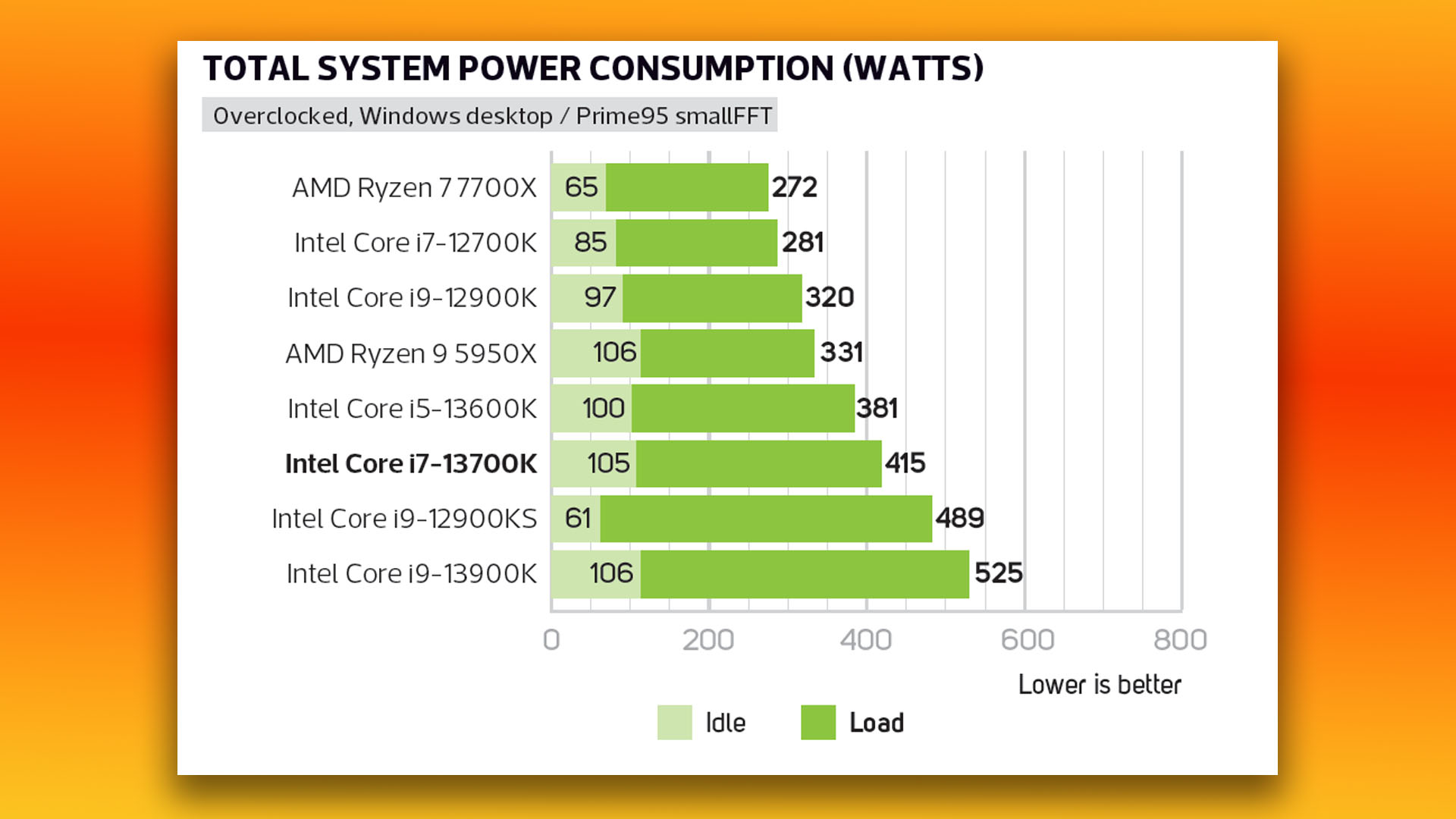
Core i7 13700K price
The Core i7 13700K has a price of around $450 at launch, which puts it in the same bracket as the new Ryzen 9 7900X if you’re just looking at chip pricing. However, there are extra costs involved with the AMD CPU, as it requires you to buy a new motherboard and DDR5 memory.
Comparatively, the Core i7 13700K will work fine with your old DDR4 memory, if you have some in an old system, and it will also slot into a last-gen LGA1700 motherboard based on the Z690 and B660 chipsets, as long as you flash your BIOS.
Both CPUs are expensive, and overkill when it comes to gaming, but they’re also both great candidates if you want your PC to have some extra power for multi-threaded work. The lower cost of upgrading just tips the balance in favor of the 13700K when it comes to value, but the Ryzen 9 7900X is also a powerful chip for the money.
Core i7 13700K conclusion
Thanks to DDR4 compatibility and support for 12th gen motherboards, the Core i7 13700K will cost less to own than the Ryzen 9 7900X once you factor in the entire system cost. The AMD chip is a little faster in some tests, but the two chips are pretty much evenly matched most of the time.
Socket AM5 may have a longer lifespan than LGA1700 in the future, but we’d still opt for the Core i7 13700K over the Ryzen 9 7900X given the current overall system cost. However, the fact remains that the Core i5 13600K is significantly cheaper and, thanks to a core count that’s not much lower, it’s really not far behind. It was even a little faster than the Core i7 13700K in some tests.
If you need the added multi-threaded grunt of the Core i7 13700K then it’s just about worth the extra money, but only when all of its cores are fully used for long periods. It’s also significantly cheaper than the Core i9 13900K, but while it’s a fantastic CPU, if your main priority is gaming, we recommend saving some money and going for the Core i5 13600K instead.
Alternatives
AMD Ryzen 9 7900X
On the face of it, AMD’s 12-core Ryzen 9 7900X doesn’t look as powerful as the 16-core Intel Core i7 13700K, but there are no low-power efficiency cores in AMD’s design. Instead, it has 12 really powerful cores, which give it loads of multi-threaded power, and it’s fast in games too. You’ll need a new motherboard and DDR5 memory to run this CPU, but it’s also much more power-efficient than the Core i7 13700K.
Intel Core i5 14600K
Since we originally wrote this review, Intel has launched its 14th gen range of CPUs, which are all based on the same Raptor Lake architecture as the 13th gen lineup. There’s not much new in these chips, but the Intel Core i5 14600K is a better buy for gaming than the Core i7 13700K. Its six P-Cores are great for gaming, particularly with their 5.3GHz boost clock, and this chip has some decent multi-threaded power from its eight E-Cores too. Plus, of course, it’s cheaper than the 13700K.
This post originally appeared on Custom PC, which has been reviewing PC hardware for over 20 years and is now part of PCGamesN. Join our Facebook group to discuss this review.
